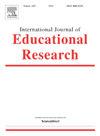Perception, beliefs and attitudes towards simulation-based learning in healthcare students: A scoping review
IF 2.5
3区 教育学
Q1 EDUCATION & EDUCATIONAL RESEARCH
引用次数: 0
Abstract
In recent years, competency-based education has been used as an innovative way of teaching to better prepare university students for their profession. One of the methods used within competency-based education are simulations. This scoping review aims to answer the following research questions: “How do healthcare students perceive simulation-based learning?” and “Which simulation types and modalities are used in simulation-based medical education and how is their perception studied?” We searched Scopus, the Web of Science, MEDLINE/PubMed, Embase, PsycINFO/PsyARTICLES by EBSCO Host and the Education Resources Information Center (ERIC) for relevant literature for our data synthesis. We also used repositories of grey literature to search for doctoral theses. The data extraction followed the methodology for scoping reviews designed by the Joanna Briggs Institute. The data analysis included 126 research papers and 6 doctoral theses. The most frequent subject of the studies included in this review were nursing students. Over half of the studies used a quantitative methodology and the majority of them focused on variations of high-fidelity simulations. The descriptive qualitative content analysis and open coding generated the following themes: mock reality, I am a professional, being part of a team and barriers. Healthcare students perceive a wide range of aspects of simulation-based learning, such as the physical environment, level of fidelity, learning process, emotions and awareness of self as a professional. Findings about the ways students perceive and view simulation-based learning can help in the process of designing and revising the curricula at medical schools that use simulations.
医疗保健学生对模拟学习的感知、信念和态度:一项范围审查
近年来,能力本位教育作为一种创新的教学方式,被用来更好地为大学生的职业生涯做准备。能力基础教育中使用的方法之一是模拟。本综述旨在回答以下研究问题:“医疗保健学生如何看待基于模拟的学习?”以及“在基于模拟的医学教育中使用哪些模拟类型和模式以及如何研究它们的感知?”我们检索了Scopus、Web of Science、MEDLINE/PubMed、Embase、PsycINFO/PsyARTICLES (EBSCO主机)和教育资源信息中心(ERIC)的相关文献进行数据综合。我们还使用灰色文献库来搜索博士论文。数据提取遵循乔安娜布里格斯研究所设计的范围审查方法。数据分析包括126篇研究论文和6篇博士论文。本综述中最常见的研究对象是护理专业的学生。超过一半的研究使用了定量方法,其中大多数集中在高保真度模拟的变化上。描述性定性内容分析和开放式编码产生了以下主题:模拟现实,我是专业人士,作为团队的一员和障碍。医疗保健专业的学生对基于模拟的学习有广泛的认识,比如物理环境、保真度、学习过程、情感和作为专业人士的自我意识。关于学生感知和看待基于模拟的学习的方式的研究结果可以帮助设计和修改使用模拟的医学院的课程。
本文章由计算机程序翻译,如有差异,请以英文原文为准。
求助全文
约1分钟内获得全文
求助全文
来源期刊

International Journal of Educational Research
EDUCATION & EDUCATIONAL RESEARCH-
CiteScore
6.20
自引率
3.10%
发文量
141
审稿时长
21 days
期刊介绍:
The International Journal of Educational Research publishes regular papers and special issues on specific topics of interest to international audiences of educational researchers. Examples of recent Special Issues published in the journal illustrate the breadth of topics that have be included in the journal: Students Perspectives on Learning Environments, Social, Motivational and Emotional Aspects of Learning Disabilities, Epistemological Beliefs and Domain, Analyzing Mathematics Classroom Cultures and Practices, and Music Education: A site for collaborative creativity.
 求助内容:
求助内容: 应助结果提醒方式:
应助结果提醒方式:


